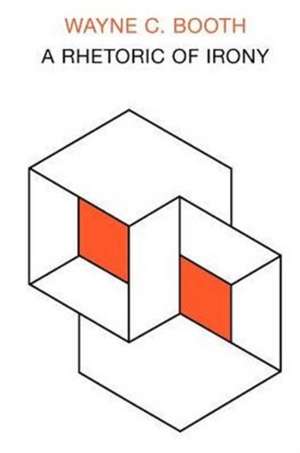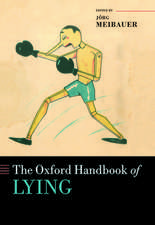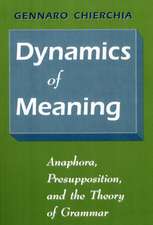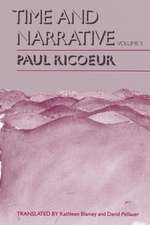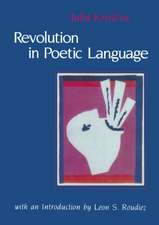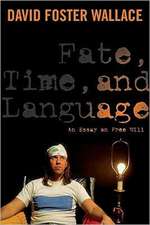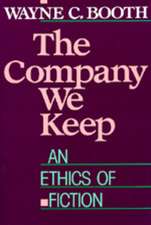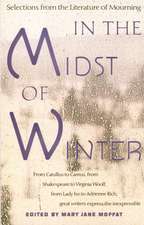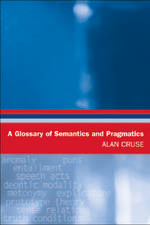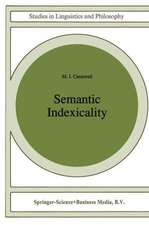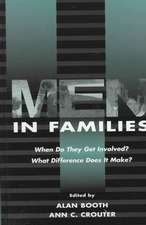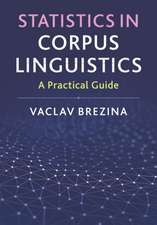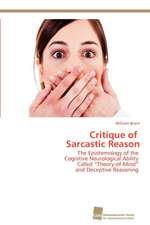A Rhetoric of Irony
Autor Wayne C. Boothen Limba Engleză Paperback – 31 iul 1975
In the first and longer part of his work, Booth deals with the workings of what he calls "stable irony," irony with a clear rhetorical intent. He then turns to intended instabilities—ironies that resist interpretation and finally lead to the "infinite absolute negativities" that have obsessed criticism since the Romantic period.
Professor Booth is always ironically aware that no one can fathom the unfathomable. But by looking closely at unstable ironists like Samuel Becket, he shows that at least some of our commonplaces about meaninglessness require revision. Finally, he explores—with the help of Plato—the wry paradoxes that threaten any uncompromising assertion that all assertion can be undermined by the spirit of irony.
Preț: 291.10 lei
Nou
55.71€ • 57.95$ • 45.99£
Carte tipărită la comandă
Livrare economică 12-26 aprilie
Specificații
ISBN-10: 0226065537
Pagini: 310
Dimensiuni: 152 x 229 x 25 mm
Greutate: 0.43 kg
Ediția:Revised
Editura: University of Chicago Press
Colecția University of Chicago Press
Notă biografică
Cuprins
Part I. Stable Irony
1. The Ways of Stable Irony
The Marks of Stable Irony
Stable Irony Compared with "All Literature"
The Four Steps of Reconstruction "
Ironic Readings as Knowledge
Meaning and Significance
Stable Irony and Other Figures of Speech
Metaphor
Allegory and Fable
Puns
Stable Irony and Satire
2. Reconstructions and Judgments
Rival Metaphors
Advantages of "Reconstruction"
Required Judgments
Some Pleasures and Pitfalls of Irony
3. Is It Ironic?
Clues to Irony
1. Straightforward Warnings in the Author's Own Voice
2. Known Error Proclaimed
3. Conflicts of Facts within the Work
4. Clashes of Style
5. Conflicts of Belief
Toward Genre: Clues in Context
Part II: Learning Where to Stop
4. Essays, Satire, Parody
Contexts and the Grooves of Genre
Complexity Illustrated
"A Modest Proposal" and the Ironic Sublime
Intentions Once Again
Intentions in Parody
5. Ironic Portraits
Dramatic Monologue
Fiction and Drama
"Ready-Made" Values
Custom-Built Worlds
6. The Ironist's Voice
Other Timbres: Metaphor Once Again
Fielding
E. M. Forster as Essayist
7. Is There a Standard of Taste in Irony?
Four Levels of Evaluation
A. Judging Parts According to Function
B. Qualities as Critical Constants
C. Success of Particular Works
D. Comparison of Kinds
The Rhetorical Meeting as Source of Norms
Five Crippling Handicaps
Ignorance
Inability to Pay Attention
Prejudice
Lack of Practice
Emotional Inadequacy
Conclusion: Neither Rules nor Relativism
Part III. Instabilities
8. Reconstructing the Unreconstructable: Local Instabilities
The Classification of Intended Ironies
Stable-Covert-Local
Stable-Overt
Unstable Irony
Unstable-Overt-Local
Unstable-Covert-Local
9. Infinite Instabilities
Unstable-Overt-Infinite
Unstable-Covert-Infinite
Stable-Covert-Infinite
A Final Note on Evaluation
Bibliography
Index
Descriere
Perhaps no other critical label has been made to cover more ground than "irony," and in our time irony has come to have so many meanings that by itself it means almost nothing. In this work, Wayne C. Booth cuts through the resulting confusions by analyzing how we manage to share quite specific ironies—and why we often fail when we try to do so. How does a reader or listener recognize the kind of statement which requires him to reject its "clear" and "obvious" meaning? And how does any reader know where to stop, once he has embarked on the hazardous and exhilarating path of rejecting "what the words say" and reconstructing "what the author means"?
In the first and longer part of his work, Booth deals with the workings of what he calls "stable irony," irony with a clear rhetorical intent. He then turns to intended instabilities—ironies that resist interpretation and finally lead to the "infinite absolute negativities" that have obsessed criticism since the Romantic period.
Professor Booth is always ironically aware that no one can fathom the unfathomable. But by looking closely at unstable ironists like Samuel Becket, he shows that at least some of our commonplaces about meaninglessness require revision. Finally, he explores—with the help of Plato—the wry paradoxes that threaten any uncompromising assertion that all assertion can be undermined by the spirit of irony.
